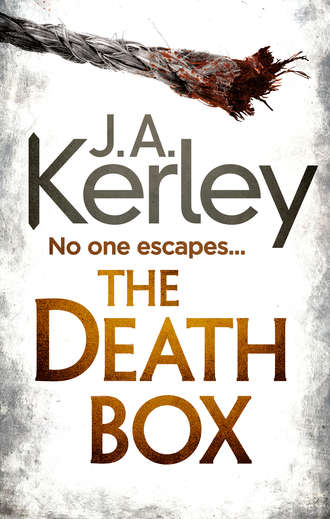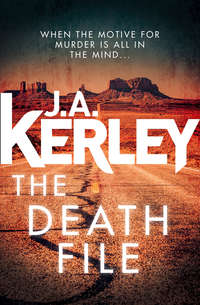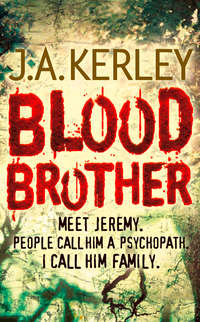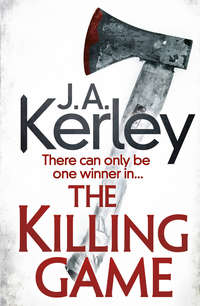
Полная версия
The Death Box
But the stone lay as silent as the ruins of Ozymandias, and after a few minutes I climbed to the upper level and quietly left the tent. Until Morningstar’s team found something to point me in a direction, I was a compass in a world without North.
Orlando Orzibel was bored. Most of the clients were paying their fees and he’d not had to go out on a threat run, always a nice time-killer: one hand held the knife, the other an open palm, fingers waving for money. If the money didn’t materialize, arrangements were made. If the arrangements weren’t honored, the knife went to work.
He checked his phone, no word from Chaku, who should be dumping the hillbilly biker, Ivy, in an hour or so, five minutes to throw the fat scuzzer down the hole, pour a couple bags of dry ’crete, book away. That fucking hole had been a gift from the universe.
Orzibel sighed and grabbed his remote, playing a porn DVD on the five-foot screen in the corner. He watched for several minutes, his hand drifting to his crotch as a burly bodybuilder with lightning-zagged tattoos pounded away at a diminutive Asian. The woman screamed and pretended to resist, but it was obvious she was a professional, probably wondering what kind of pizza she’d order after she drank the guy’s jizz.
Fuck fuck. Orzibel flicked off the video and tugged at his genitals. How long since he’d gone to the basement? There were four girls tucked away down there, plus Chaku’s new toy. All were fresh procures, raw, not yet ready for assignment, though getting close.
The process could always be sped up.
With the pounding bass of electronic dance music pulsing through the walls, Orlando Orzibel descended to the shadowy basement of the nightclub, a warren of concrete-walled rooms. The nightclub had been built by Mob money during Prohibition, the main floor a speakeasy, the basement used for prostitution and other illicit activities. The water-seeping wall was still strung with dozens of ancient and fraying wires mounted on ceramic insulators; the wires originally connected to banks of telephones forming a subterranean bookie operation, the largest in all Miami.
Orzibel wrinkled his nose at the smell of mold and unlocked the heavy gate at the base of the steps. Built of cyclone fence welded within a reinforced steel frame, the gate had taken three powerful men plus Chaku Morales to hang it on its industrial-grade hinges. Orzibel pushed open the first door he came to, seeing two girls asleep on a mattress, a ragged cover over their bodies. What were their names? Did it fucking matter? They were heading to Jacksonville tomorrow. He bypassed the next portal, the room holding Chaku’s fresh bride, not Orzibel’s business. He pushed open the following door, saw one of the new acquisitions – Yolanda? Her eyes grew huge and terrified. He’d had a session with her yesterday.
“Later, puta,” Orzibel said, pulling the door tight. He reached the next door. Who was in here? Ahh … little Leala, the pretty one. Orzibel replayed the trip back from the delivery, felt her struggle under his hands. He touched himself.
Yes!
Orzibel pushed open the door to a cramped room, the walls gray and stained with leakage, pipes and ducts crowding the ceiling. Two king-size mattresses were on a frayed green carpet and an open toilet was in the corner. A small and battered television sat on a stool in the corner, the program – a soap opera on Univision – blurry and tinted a bilious green.
On a mattress and swiftly pushing back into the corner was the girl. She was a beauty and Orzibel felt a wild grin propelled to his face. “Ah, how’s our little Leala today?” Orzibel crooned. The girl cowered in the corner, pulling a blanket over her ragged yellow dress.
“G-go away, señor.”
“What did you say to me?”
“Please, señor. No.”
Though she was terrified, there was something in her eyes. Dios … could it actually be defiance? He snapped the blanket away and threw it to the floor. “You do not make the rules here, Leala,” he said, unbuckling his belt. “Let me see … where did we leave off?”
“I do not w-want to—”
‘YOU DO NOT TELL ME WHAT YOU WANT. I TELL YOU WHAT TO DO!” Orzibel dove onto the bed and grabbed the girl’s arms. “Open that pretty mouth, Leala.”
“No!”
What was it with this one? His hand slashed and Leala’s head spun. “One call and I can have your mama’s eyes carved from her head. Do you know what that feels like, Leala?”
Crying. Orzibel’s frenzied hands pulled his pants and silk boxers lower as he perched on his knees, his fingers grasping the girl’s hair as he pulled her close. “Work on this the way I taught you. With tenderness.”
Her head moved closer and her lips parted. But her face seized in agony and her hands rose as if guided by a separate force, pushing him away. Leala’s legs kicked at Orzibel as she backpedaled across the mattress.
“Filthy little bitch,” he hissed, yanking his pants to his ankles. He seized her hair and wrestled her to him, climbing over her, clamping her arms to the mattress and spreading her with his knees. A hand tore away her underwear.
“OPEN IT UP!”
“NO NO NO …”
He spit in his palm and rubbed it over his penis, then grabbed Leala’s shoulders and fell across her, his tongue licking her face as his buttocks rose and fell. The act took under a minute and he emptied into her with a shuddering gasp. He startled to a sound at the open door but when he turned saw no one. He withdrew and Leala sprawled as if dead, her slender legs wide and a circle of blood at the apex.
“You are a woman, now, Leala,” Orzibel proclaimed as he stood unsteadily. “You can do a woman’s work.”
8
The horrific column at the forefront of my mind, I drove home to Matecumbe Key, unable to understand the level of violence frozen into the concrete. I had a couple of pieces of fried chicken in the fridge and took them to the deck. The sun was riding a pillow of purple clouds to the horizon and a golden light suffused the air. A wobbling strand of pelicans skimmed across the cove barely a foot above the waves.
“Hey neighbor,” a voice called, suspending my unsettled thoughts. I saw Dubois Burnside at the point of the cove. “You doing anything important?” he called through cupped hands.
“Not sure I ever have,” I returned.
“How about you come by the house?” he said, overlarge gestures miming the pouring of a drink.
I shot a thumbs up. “There in fifteen.”
I threw on a fresh shirt and snatched up a bottle of liquor I’d received at a going-away party last month, dropping it into a brown bag. Burnside’s home was past a football-field-long buffer of vegetation and surrounded by a cream-colored wall with an ornamental gate at the entrance, a pair of mirroring flamingos perched on single legs. I hit the buzzer and heard the gate unlatch.
I walked down the drive to his home, a combo of styles, Moorish Art Deco, I suppose, the Moorish displayed in two stories of textured stucco tinted yellow and topped with terracotta tiling, the Deco reflected in flamingo-themed grating over wide and manteled windows. The drive ended in a portico shading a blue 500-series Mercedes and a spiffy red Beamer convertible. The plate on the Merc said FUNRL 1, the Beamer’s said ZAZZI.
The front door was iron-belted mahogany recessed within an arched vestibule, more Moor. Marble slabs framing the portal sported bas reliefs that echoed the Deco flamingos. The door opened as my hand reached for the iron handle. Instead of Dubois Burnside, I beheld a handsome black woman in a floor-length red gown with a décolleté my eyes did not follow to its conclusion because that would have been impolite. I judged the lady in her early forties, and she was not much shorter than my six feet.
“You must be Mister Ryder. I’m Delita Matthews.”
She extended her hand on a long and slender arm dressed in silver hoops. “Dubois will be with us in a minute. I told him to change into some decent clothes and not wear them saggy old pants. Every time I catch up to them pants I toss ’em in the trash.”
“And every time I fish them out, baby,” Burnside said as he strolled into the room in threadbare cargo shorts beneath an extravagantly embroidered Mexican wedding shirt. His feet flapped in ancient huaraches.
Delita aimed a long red fingernail at me like I was Exhibit A in a courtroom. “We got company.”
“He ain’t company, he’s our neighbor.”
The woman shot Burnside a raw glare but when she spun to me the eyes were Kahlua and cream. “You must be thirsty, Mr Ryder. May I get you a drink?”
“Actually,” I said, pulling the bottle, “I brought this along. It’s supposed to be pretty fair and I thought—”
“Hot damn,” Burnside said, plucking the bottle from my hand and squinting at the label. “This is thirty-year-old brandy.” He held the bottle up to Delita Matthews. “Company brings hoity-toity wine, girl, neighbors bring fine brandy. Grab us a couple tumblers.”
“We have brandy snifters, Dubois.”
“I wanna drink it, not slosh it around.”
But snifters it was and I poured hefty tots for Burnside and myself, Miz Matthews demurring. “I’m meeting friends at the Saddle Club in a few minutes,” she said. “There’s an orchestra and dancing, but Dubois refuses to go.”
“I boogie,” Burnside proclaimed. “I don’t cha-cha.”
Miz Matthews sashayed across the floor to the door, opened it and started out. A second later she leaned back in. “You using them coasters ain’t you, Dubois?”
“Baby, you got ’em covering the table from end to end,” Burnside called over his shoulder. “A man can’t set down his glass without landing on a coaster.”
The door closed and Burnside took a sip of brandy. “I don’t know what this thing is I got for bossy-ass women, but I got it. Had four wives and ever’ one had a face like an angel and a thumb built for mashing me down.”
The psychologist in me wanted to ask about his mother, the diplomat in me demurred. We shot the breeze for twenty minutes, Burnside providing the low-down on local bars and eateries. Talk inevitably drifted to occupations. “In my line of work I’ve seen some badly mangled bodies, Dubois,” I offered. “I’m always amazed when I see what a good mortician can do.”
Burnside set his snifter on the table – between two coasters – and leaned forward. “Remember that scene in The Godfather, Sonny’s been shredded by machine guns and Marlon Brando tells the mortician to make Sonny presentable at the funeral? I been there, Carson.”
“You knew Marlon Brando?”
“Ha! I mean I’ve had to do reconstructions where the body was more putty and paint than person. A couple decades back two workers were on a catwalk at a paint company, standing above a huge mixing vat with these big steel propellers choppin’ through the paint. The catwalk tore from the wall and these two poor guys got dumped into the vat. Before the machine shut down the bodies got all busted up and mixed in together.”
“Jesus,” I said, aghast.
“You wouldn’t believe the time I had getting the deceased cleaned and arranged in whole bodies again. It was like doing a jigsaw puzzle with meat.”
Pictures started to arrange in my mind. I saw bodies whirling in paint. Arms, legs, faces became a kaleidoscopic jumble as I set my glass down on one of a dozen coasters.
“I gotta go, Dubois. I need to make a call. Give Delita my regards.”
“You all right, Carson?” Burnside frowned. “You look like you’re seeing a ghost.”
I blew out the door and dropped into a sprint with a gibbous moon lighting my way. I had to call Roy and have him set up a meeting first thing in the morning.
Dance music pulsing from below, Orlando Orzibel sipped a mineral water and considered his escapade with Leala Rosales. He’d lost control, a bad thing. But the little bitch had it coming, talking to him like that. Before leaving he’d told the weeping girl to wash herself, rinse the sheet, and keep silent on the matter if she valued her mother’s life. The little whore would not talk.
The cell phone buzzed from the glass table beside Orzibel. He snatched it up, checked the number, grinned and put the phone to his ear. “You must be finished with the business in the trunk, Chaks … Got that Ivy planted, right?”
After a few seconds the grin inverted, his voice a tense whisper. “A tent? A fucking tent? Bulldozers? I figured that hole would stay hidden until Christ himself showed up.”
Orzibel hung up and threw the phone to the couch. He went to his desk and retrieved a second phone, a burner, to be used and discarded. He dialed a number from memory.
“It’s Orlando, Jefé. It seems we have a problem.”
9
Roy had set the meeting at eight a.m. Instead of the three promised members of the investigative crew there was only Valdez. Luckily, Delmara, Morningstar and Gershwin made the table look less empty.
“Where’s Tatum and Canseco?” I asked Roy. “Degan?”
“Turns out they had other commitments.”
I gave him a look. He said, “They’re busy boys.”
“I got a crime scene needs me,” Morningstar said, long and elegant fingers ticking colorless nails on the tabletop. Gershwin yawned in his tipped-back chair. Delmara sat a pen and pad in front of him and scratched his beak.
“Dr Morningstar,” I said, laying out my case to the small audience, “would you outline the scope of the injuries you’ve been able to identify?”
“Like I’ve said, I’m seeing the kind of injuries I associate with high-impact vehicle accidents.” Her hands went to a file of photos on the table. “I have the exact details here if you—”
“Have you found any seams in the matrix, Doctor? Yesterday I theorized dry cement poured into the cistern atop added bodies. After further thought, I suspect the next layer would not perfectly adhere to the preceding concrete. It would leave discernible seams.”
She shook her head. “The concrete matrix appears to be contiguous. Where are you going with this?”
“I’m pretty sure I know how the bodies got there.”
“How?”
“In a cement-mixer truck.”
Eyes-wide stares from everyone. Roy said, “Explain that one, Carson.”
I spun my index fingers around one another. “Ever see the inside of a mixer drum? It’s an inside-out auger. The rotating vanes force concrete deeper to keep it mixed. At the jobsite the rotation is reversed and the screw action lifts the concrete up and out of the drum.”
“Jesus,” Morningstar said, reaching into her file and pulling out eight-by-ten photos of the column, staring at the jumble of arms and legs and faces and concrete. “It explains the brownish cast to the concrete,” she said quietly. “It’s blood.”
“Sure explains the damaged bodies,” Roy said.
I nodded. “It’s a blender on wheels.”
Morningstar rose, clamped shut her briefcase. “There’s a lot to do before I can verify anything like your mixer theory, but I have to say it’s decent, Ryder.”
I nodded my thanks and she was gone. Roy turned to Valdez and Delmara.
“Guys?”
“I gotta think about it,” Delmara said. He was trying to look upbeat, but I’d punctured part of his serial-killer explanation. Roy angled to Valdez.
“Ceel?” Roy said to Valdez.
“Just what is it you’re looking for, Ryder?” she said, aiming her big eyes into mine. They weren’t saying Congratulations on a spiffy idea.
“Looking for, Detective Valdez?”
“The Carson Ryder morning show here. You want something, right?”
“We have to start looking into concrete mixing companies, Detective. We need someone who can ask the right questions and tell when the answers are shaky. A pro.” I used the inclusive we, hoping to spark camaraderie. There was a coterie of FCLE investigators at Roy’s disposal – and, I supposed, mine as well – but I wanted the experience of the department’s top people, hoping a few hours of working together might diminish the wall between us.
Valdez reached to the floor for her briefcase and popped it open, coming up with a two-inch-thick folder. She dropped it on the table, whump.
“These are my current cases. Where does we fit in?”
I resisted the urge to look to Roy for assistance and didn’t hear any, the silence of the Buddha.
“Or,” I said, “I could grab some folks from the pool investigators downstairs.”
“That sounds like a good idea,” Valdez said, standing.
Delmara followed suit, tucking his notepad into his suit jacket and forcing a half-smile to his face. “Nice idea on the mixer, Detective,” he said, following Valdez out the door.
Roy grabbed my shoulder. “Great theory, Carson! Morningstar was gushing over the idea.”
“Gushing?”
“If Vivian isn’t pissing on an idea, it’s gushing. You’re winning her over, bud.”
“Yeah? What about the others?”
We heard a cleared throat and turned to see Gershwin, chair tipped back, dressed in black jeans and a T-shirt advertising a surf shop. Both Roy and I had forgotten about the kid. “If y’all don’t need me for anything,” he said, “the folks in maintenance would like me to mop the bathroom with my tongue.”
Roy tucked away his notes and nodded absently. “Good for you, kid. Keep it up.”
Gershwin shook his head and was gone.
10
Roy and I elevatored down to the investigators’ floor, a horizontal hive of cubicles like I’d vacated in Mobile. Harry and I had our jammed-together desks closest to the elevator and my eyes turned there when the door opened, seeing not a lineman-sized black man dressed in a clashing color palette, but a white guy in his mid fifties with a wind-tunnel blowback of gray hair and Elvis Costello glasses. It wasn’t Harry but a Florida version of Martin Scorsese, and for a moment the world felt unsteady.
Where am I?
“Here you go, Carson,” Roy said, snapping me back to the present. “Grab who you need.”
I studied the cubicles, most empty. The ones holding people held busy people: some guys on phones furiously scribbling notes as they talked, two women and a man bent over a desk and arranging photos, a pair of guys arguing in another cube.
“Everyone looks busy, Roy.”
He laughed. “What … you think I keep my lovelies sitting in a corner and jiggling their nuts while they wait for an assignment? Who looks good, Carson? Pick an assistant or two. Shit … wait … let me introduce you to everyone.”
I heard myself giving my Happy to Be on the Team speech a dozen more times while trying to remember a roster of names.
“How about Gershwin?” I said, seeing the kid reading in a far corner. “He doesn’t look busy.”
Roy looked uneasy, like I might actually be serious. “That would make Gershwin a member of the crew, Carson, maybe not a great idea right now. The others might get a bit miffed that—”
“Who gave me the You’re-in-Charge speech, Roy?”
Roy puffed out a resigned breath. I walked across to Gershwin, still licking his thumb and turning pages. “What you reading?” I asked.
He held up the Yellow Pages for Miami-Dade. “I’m scoping out the concrete section. I didn’t know anything about this crap before.”
“You got anything going on right now?” I said. “I might be able to use you.”
He tossed the book and leaned back in the chair with his hands behind his head and kicked his heels up on the desk. His smile was as wide as it was false. “What, Alabama … you need coffee? A shoe shine? Someone to run your laundry to the cleaners?”
“You seem to have an attitude problem, Gershwin.”
“I came here to work and instead I get treated like I spit in the face of everyone in the FCLE. You know what F-C-L-E spells, right? Fickle. McDermott treats me like I’m transparent, and everyone else looks the other way when I walk in a room.”
I pushed his feet off the desk. He wasn’t expecting it and it brought him to sitting erect. I sat where his feet had been and looked him in the baby browns. “If you’re unhappy all you need to do is complain to the family of that kid you saved and have them pull strings on your behalf. Again.”
The chin jutted. “I never asked them to push for me.”
“Your refusal technique must be flawed. A powerful family offered you an unearned step up and you took it.”
I’d scored a hit. The kid started to argue, had nothing. He nodded at me. “Truth is, I was tired of handling DUIs, brain-dead methheads and crackers screwing their dogs and daughters. I wanted action and when the kid’s family said to pick my spot, I said Miami.”
“And here you are. What do you expect to happen?”
“What else? McDermott’s gonna dump me at some backwater desk until I get tired of pushing paper and retreat to the sticks.”
“And that’s what you plan to do … quit?”
“That’s McDermott’s plan. Mine is to, to …” He pulled up short and frowned.
“What?”
“I dunno,” he said, honestly perplexed. “I don’t have a clue.”
I pushed the Yellow Pages his way. “Here’s an idea: start checking concrete companies for employees with criminal records. Or does that lack the action you’re looking for?”
11
The dark-haired woman finished tapping on the MacBook Air and switched it off. She sat behind a mahogany desk, antique and polished to a soft gloss. The sole light flowed from a Tiffany-shaded desk lamp and the woman’s olive skin seemed to glow in the light. She wore a sedate navy ensemble, her dark hair curled in a businesslike chignon.
“I’ll be finished in a moment, Orlando,” she said.
There were no personal trappings in the room, no pictures of family or mugs with funny sayings. The desk held only an in and out basket, the latter holding a neat stack of various invoices. The office – painted in a sedate, mossy green with two windows draped in burgundy – was almost as large as Orzibel’s.
The woman turned to the credenza behind her desk. The doors opened to a built-in floor safe the size of a mini-fridge, welded to the frame of the building and immovable. The safe was designed to resist nearly any assault short of cannon fire. She locked the computer in the safe and reclosed the credenza.
“When is the man arriving?” she said, looking across the room.
“The client is downstairs with a bottle of Dom Pérignon,” Orzibel said, waiting in a wing-back chair with hands tented beneath his chin. He was in soft black leather: jacket, vest and pants. His boots were tipped with silver and ticked in time to the bass notes filtering through the floor.
“Dom? On the house?”
Orzibel laughed. “What he spends with us, I don’t care if he drinks a case of it.”
“Is the product ready?”
“Tericita, and Alicia. And Yolanda from the fresh shipment. I will present them when the client is ready, a parade. The man likes little parades before his party.”
“All dressed the same, right? For his choosing?”
“Si. It must be the pink dresses and pink canvas shoes. White panties. And red scarves for the hair. I keep a supply of several sizes in my office for when the client wants a party.”
“Mr Chalk hurt one last time, Orlando. Badly.”
“He paid well for his sport.” Orzibel’s long fingers made the money-whisk. “Are you suddenly concerned about their welfare?”
“I’m concerned about arousing attention. The man is not of normal mind.”
Orzibel waved her words away. “I have taken extra precautions by reserving a rear cabana suite at the Oceana, where sounds cannot travel through the trees. Chaku will stay nearby during the man’s festivities, though he will not interfere unless sounds carry.”
“We must be able to trust the owner of the Oceana, Orlando. Totally.”
“The owner has a side business selling various substances. He knows we know this. And I promised him an evening with one of our best products. Free.”
The woman gave Orzibel a look of irritation and turned to retrieve the MacBook from the safe, setting it on her lap. “You must always tell me when you make side arrangements, Orlando. I must note it or the records will be off.”







